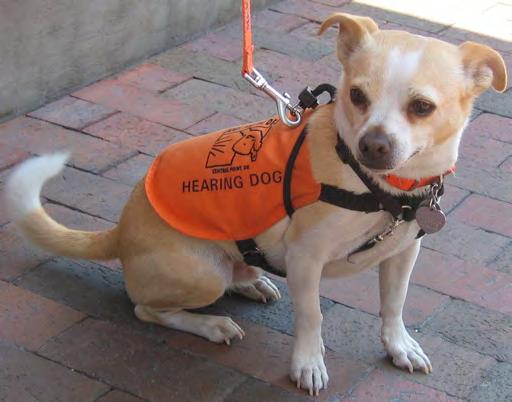
4 minute read
REGULATING ASSISTANCE FOR DISABLED PEOPLE IN CANADA
A Private Members Bill in Prince Edward Island has sought to strengthen the duty to accommodate service dogs through standardised identification and registration
Hon. Brad Trivers, MLA is a Member of the Legislative Assembly of Prince Edward Island representing District 18 Rustico-Emerald since 2015.
Under the Canadian Human Rights Act and Provincial human rights codes, individuals with disabilities have the right to equal access to public spaces, which includes the duty to accommodate disabled persons with service animals. Despite this, people who rely on service dogs (also known as assistance dogs) often face barriers due to inconsistent recognition and understanding of their rights - both by the public and by operators of public spaces.
A service dog is trained to assist a person with a disability. The work performed by a service dog must be directly related to a person’s intellectual, mental or physical disability.
This case study explores the efforts undertaken in Prince Edward Island (PEI), Canada, to address these challenges through the introduction and passage of the Service Dog Act (Fall 2024) as a Private Members Bill.
The legislation aims to create a clear framework for identifying and registering valid service dog teams to improve public awareness, support enforcement and ensure accommodation. This study ultimately recommends a standardised, pan Canadian (and ideally Commonwealth wide) service dog identification and registration system.
The Challenge
Despite longstanding legal obligations under the Canadian Human Rights Act to accommodate individuals with disabilities, public access for service dog teams remains inconsistent. Two key issues contribute to this:
1. Lack of Awareness and Training: Staff in restaurants, taxis, airports and other public spaces often lack understanding of their duty to accommodate individuals accompanied by service dogs.
2. Fraudulent Representation: Increasingly, individuals are misrepresenting untrained or emotional support animals as service dogs, eroding public trust and making enforcement difficult. These issues are compounded when service dog teams travel across Provincial or National borders. Each Canadian jurisdiction currently has its own approach - ranging from no formal legislation to fully developed registries. The absence of a standardised approach may lead to inconsistent treatment, particularly in interjurisdictional or international travel.
Legislative Response:
The Prince Edward Island Service Dog Act
In response to this growing concern, the Legislative Assembly of Prince Edward Island passed the Service Dog Act in the Fall 2024 sitting. Modelled after legislation in Nova Scotia, the Act establishes:
• A standard definition of a service dog and service dog team.
• A government-led certification and registration process for teams meeting specific training and behavioural standards.
• Identification cards and vests to be issued to approved teams.
• Fines and penalties for individuals who misrepresent unqualified animals as service dogs.
• A proclamation clause requiring the Act to come into force within two years of Royal Assent (by Fall 2026). This legislation provides clarity for individuals with disabilities, enshrines their right to access public spaces, and offers tools for businesses and the public to distinguish legitimate service dog teams.
Interjurisdictional Issues
A critical gap remains in ensuring consistent recognition of service dog teams across provincial, national and international borders. Current barriers include:
• Varied definitions and training requirements across jurisdictions.
• No standard visual identification for service dogs.
• No interoperable registry accessible across borders. As a result, legitimate service dog teams may face denial of access when travelling - undermining their rights and safety.
Recommendations
To better support persons with disabilities and uphold human rights across the Commonwealth, the following recommendations are offered:
1. Develop a Pan-Canadian Standard: Provinces and Territories in Canada should collaborate through the Federal government to harmonize service dog legislation and establish a national registry and ID standard.
2. Enable Cross-Border Recognition: Work with international partners and Commonwealth nations to create agreements recognising service dog certification across borders.
3. Educate Public and Service Providers: Launch coordinated campaigns to raise awareness of the duty to accommodate, the appearance of valid IDs and consequences of fraudulent representation.
4. Promote a Commonwealth Model Act: Leverage CPA networks to advocate for a model Service Dog Act that can be adapted across Commonwealth jurisdictions.
Conclusion
The duty to accommodate persons with disabilities is a fundamental right, but without clarity and consistency in service dog recognition, it is too often denied.
Provincial legislation represents a critical step toward addressing this gap. However, broader national and international cooperation is essential to create a standard that ensures dignity, independence and accessibility for all service dog users.
For further information about the Service Dog Act in Prince Edward Island please visit https://bradtrivers.com/peilegislature/service-dog-act/. Artificial Intelligence (AI) was used in the preparation of this article.

